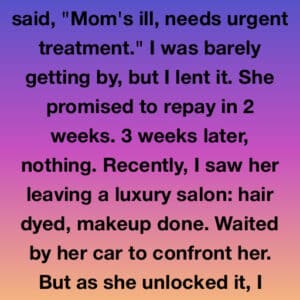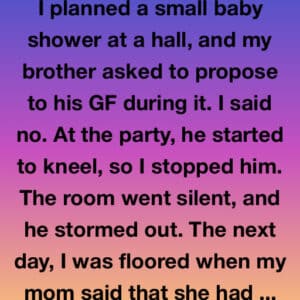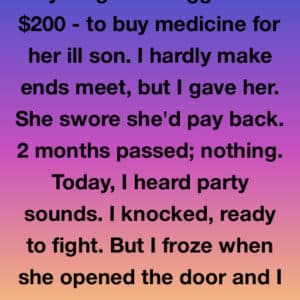My stepson, Ethan, says he has social anxiety. For a long time, I honestly believed he was just spoiled.
He’s sixteen, brilliant, and lives with my husband, Robert, and me in our comfortable home in San Diego, California. I always told myself I was being patient, even supportive, but deep down I saw his behavior as a performance. He avoided family events, refused to talk to adults, wouldn’t call in a takeout order, and froze if he had to ask a store clerk a simple question.
To me, it wasn’t anxiety. It was manipulation. Learned helplessness. And Robert—his biological father—enabled it. Every time Ethan shut down, Robert stepped in to rescue him. My frustration hardened into quiet resentment.
Advertisement
One night at a busy, loud Italian restaurant downtown, I decided I’d had enough.
We were out for a rare family dinner. When the waiter came to take our orders, Ethan immediately tensed. His shoulders rose, his eyes dropped to the table, and he went silent.
“Order for yourself or go hungry,” I told him firmly. My tone was calm, but my mind was set. I wasn’t going to step in this time. I told myself this was a life lesson—a little discomfort now to avoid helplessness later.
His eyes went wide. He whispered what he wanted and begged me to say it for him. His hands shook slightly, and he seemed to withdraw into himself, as if the entire restaurant were pressing in on him. The waiter hovered uncertainly, glancing between us.
I held my ground.
The waiter eventually took Robert’s order and mine. Ethan said nothing. In the end, he was left with a glass of water while I ate my favorite pasta. I deliberately focused on my plate, cutting the food into neat bites, telling myself I was doing what a “good” parent should do—refusing to indulge his supposed drama.
Ethan barely moved. His head stayed bowed for most of the meal. He didn’t look up, didn’t speak, just sat there listening to the clatter of dishes and the buzz of conversations around us. When we finally left, he still wouldn’t meet my eyes.
As we stepped outside, he spoke in a low voice that chilled me.
“You’ll regret this,” he said. Not loud, not hysterical—just cold, focused anger I had never heard from him before.
For the next few days, I braced myself for typical teenage backlash: rude comments, slammed doors, maybe something petty and destructive. But Ethan stayed quiet. Withdrawn, yes—but calm. No outbursts, no open defiance.
I told myself I’d finally gotten through to him. I decided that tough love had worked.
Two days later, a social worker from the county health department showed up at our front door.
Her name was Ms. Perez. She introduced herself, showed her badge, and said she needed to speak to both Robert and me about Ethan’s “immediate safety and well-being.”
My stomach dropped.
I was sure Ethan had reported me—maybe twisted the restaurant incident into something it wasn’t. I prepared my defense before we even sat down. I explained that I was trying to encourage independence, that he wasn’t in danger, that he was just resistant to basic social expectations.
Ms. Perez listened politely, but her expression didn’t soften.
When I finished, she gently shook her head.
“Ethan did not contact us to report you,” she said. “He sent something else.”
She took out a tablet, tapped a few times, and pulled up a video.
It was a short, shaky clip. Ms. Perez explained Ethan had secretly recorded it at the restaurant that night. The camera pointed at what looked like nothing: the high, upholstered partition wall next to our booth. The audio was muffled under the background noise of clinking cutlery and loud conversation.
“At first, it didn’t seem like anything,” she told us. “But once our tech team enhanced the audio, we realized what Ethan had captured.”
She pressed play.
Through the crackle and hum of the restaurant’s noise, another conversation emerged—two men talking in low, guarded voices. They were discussing money laundering and extortion involving local construction contracts and a specific municipal project that had mysteriously stalled. They talked about inflated costs, fake delays, and how to make the losses look legitimate on paper.
My blood ran cold.
Ms. Perez continued, “Ethan wasn’t panicking about ordering food. He was panicking because he was overhearing serious criminal activity from the people sitting behind you. His anxiety in that moment was not only about social interaction—it was heightened awareness. He felt trapped, afraid they’d notice him if he reacted.”
As she spoke, my memory of the night shifted. The way Ethan froze. The way his eyes seemed distant, like he was listening to something none of us could hear. His whispered, frantic pleas I’d interpreted as manipulative.
He hadn’t been begging for food. He’d been begging for help.
Then came the final twist.
Ms. Perez told us that the men in the recording weren’t strangers to our family. They were the same people who had been extorting Robert’s small construction business—pressuring him for kickbacks and inflating material costs through “preferred vendors.”
The financial strain Robert had been hiding from me suddenly snapped into focus. The delayed projects. The unexplained losses. The stress he brushed off as “just business being slow.”
Ethan’s social anxiety—the thing I had labeled spoiled behavior—had accidentally exposed a criminal operation that was quietly destroying our livelihood.
In the weeks that followed, everything moved quickly. We were put in contact with federal investigators. Ethan’s video and his near-photographic memory of what he’d heard became key evidence. He was able to describe specific terms, amounts, and references the men had used, filling in the gaps the audio couldn’t.
Investigators built a strong case. Robert cooperated, providing records and testimony under protection. The crime ring began to unravel.
And while the legal world moved in its methodical, complicated way, I had to face something much more personal: the way I had treated my stepson.
I had dismissed him. Labeled him. Shamed him. I’d decided his experience wasn’t real because it didn’t make sense to me.
We found Ethan a highly specialized therapist who worked with social anxiety and sensory overload. Sessions focused on helping him manage his hyper-awareness rather than suppress it. I stopped forcing him into situations “for his own good” and started listening when he said something felt like too much.
I learned that what I saw as overreaction was often his nervous system working overtime. Crowded spaces, noise, unpredictable interactions—they didn’t just make him uncomfortable; they overwhelmed him.
Slowly, our home changed. Robert was more transparent with me about the business. I was more transparent about my mistakes with Ethan. We began to build trust, not on my idea of how he should act, but on who he actually was.
And who he was turned out to be extraordinary.
His keen observation, his tendency to notice details others overlooked, his instinct to record what he thought might be important—all the things I’d once framed as “paralysis” or “avoidance” became the very traits that saved our family’s future.
Robert’s company was stabilized. The extortion stopped. He recovered from massive financial losses, and he often said, quietly, “Ethan saved us.”
I now see Ethan not as the “difficult” kid I tried to fix, but as the hyper-aware young man who carried a burden I didn’t understand. His anxiety is real. His sensitivity is real. And his strength is real.
The lesson for me was humbling and absolute: never confuse sensitivity with weakness, or anxiety with entitlement. Some people fight battles that are invisible until they crack open in a single, life-changing moment.
Ethan’s warning—“You’ll regret this”—wasn’t a threat. It was a frightened, desperate prediction from someone who knew something terrible was happening and had no idea how to say it.
Now, I listen when he speaks. I pay attention when he goes quiet. I ask questions instead of making assumptions. And I try, every day, to earn back the trust I carelessly damaged.
If you believe in recognizing hidden strengths and treating anxiety with compassion, please consider liking and sharing this story. Have you ever completely misjudged a loved one’s struggle, only to discover later how wrong you were?





